WMG News
RESOLVE prototypes shape future of electric urban commuting
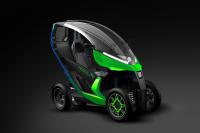 The future of daily urban commuting could be small, lightweight Electric L-category Vehicles (ELVs). A cost effective, energy efficient and comfortable alternative to traditional cars in cities, is at the heart of the €6.92m RESOLVE project, which included WMG at the University of Warwick.
The future of daily urban commuting could be small, lightweight Electric L-category Vehicles (ELVs). A cost effective, energy efficient and comfortable alternative to traditional cars in cities, is at the heart of the €6.92m RESOLVE project, which included WMG at the University of Warwick.
The European project – named ‘Range of Electric Solutions for L-category Vehicles’ – designed and developed two stylish tilting four-wheeler prototype ELVs with leading European manufacturers Piaggio and KTM. These demonstrators were unveiled, and presented to representatives from the European Commission, at an event in Brussels in April 2018.
WMG was one of fourteen partners in the project, which included leading names from industry and research such as Piaggio, KTM, Bosch, Ricardo, the Austrian Institute of Technology, and the University of Florence.
WMG welcomes a delegation from the Indian Consul
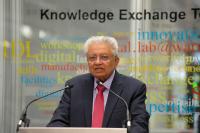 Professor Lord Bhattacharyya was pleased to welcome a delegation from the Indian Consul to WMG on Tuesday (22 May 2018).
Professor Lord Bhattacharyya was pleased to welcome a delegation from the Indian Consul to WMG on Tuesday (22 May 2018).
The delegation was led by Dr Aman Puri, Consul General of India, Birmingham and Dr Achyuta Samanta, Honourable Member of Parliament, Founder of Kalinga IIT and Kalinga Institute of Social Sciences; and Mr Vikramaditya.
The guests met with Professor Lord Bhattacharyya before enjoying a tour of our International Manufacturing Centre, Energy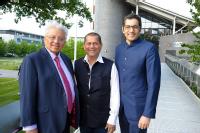 Innovation Centre, and the National Automotive Innovation Centre.
Innovation Centre, and the National Automotive Innovation Centre.
Afterwards the delegation was joined by members of the Indian community in the West Midlands for a drinks reception.
Racing ahead with Richard Crosse
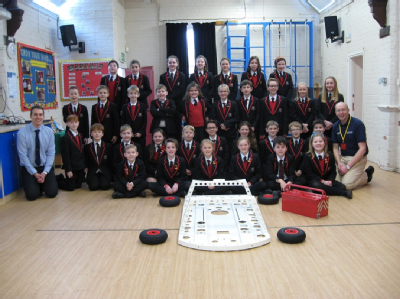 Class 5 at Richard Crosse C of E Primary School, Kings Bromley, Staffordshire won a competition run by the APC to become one of eight schools to build and race a Greenpower Formula Goblin G2 electric go-kart.
Class 5 at Richard Crosse C of E Primary School, Kings Bromley, Staffordshire won a competition run by the APC to become one of eight schools to build and race a Greenpower Formula Goblin G2 electric go-kart.
The project is funded by the ESPRC (through the APC), and each winning school is partnered with an APC-Spoke, offering guidance and support to the students. Partnered with WMG in January 2018, 32 children aged 9 to 11 made up of 19 from Year 6 and 13 from Year 5 began working on the car. To align with the Year 6 children working towards their KS2 SATS, the breakdown of the tasks is as follows:
- Spring term 2018: Year 6 to assemble the car kit
- Year 5 to run a whole-school car bodywork design competition
- Summer term 2018: Year 5 to build and decorate the car bodywork
- Year 5 and 6 to complete driver training and race-day preparation
Each week at least nine of the children work on the project, under the supervision of their class teacher, Mr Joe Davies, and/or Dr Antony Allen from WMG. Children work in two teams of three to assemble parts of the car. A third group also record a vlog.
Build sessions take place at the school on Friday afternoons. As well as building the car, during the spring term all of the Year 6 children have used Siemens SolidEdge CAD software to check component assembly and get a better feel for how the car goes together. Each week all of the pupils complete a worksheet explaining what they’ve worked on and how it went. They are encouraged to draw diagrams, label drawings, and link to screenshots from the CAD software.The children have also been creating individual portfolios as part of an AQA award in Systems, Design and Manufacturing.
The worksheets, collated over the whole project, will create an individual project portfolio for each pupil, and put together they create the team portfolio which can earn extra points on race day.
Two engineering undergraduate students Shafiul Alam and Gosia Wojtala from Warwick Racing, and Jen McGlade from the APC have also taken time to visit the children and support and inspire them.
Team effort
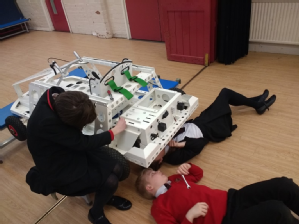 The whole project has a real community feel to it. Parents have created a storage shed for the car, there’s been a car bodywork design competition for the whole school, weekly vlogs and a special display area in the school. Overall, more than 100 pupils aged 3 to 11 are involved in this STEM project.
The whole project has a real community feel to it. Parents have created a storage shed for the car, there’s been a car bodywork design competition for the whole school, weekly vlogs and a special display area in the school. Overall, more than 100 pupils aged 3 to 11 are involved in this STEM project.
As we enter the summer term the mechanical build of the car is almost complete. Year 5 are about to start on the bodywork build and integrating design proposals from winning entries in each class.
What’s next
In June, Class 5 visited WMG and the APC showcase. They took part in a CAD workshop, learnt about life as a university student, and, at the APC, heard about 21st century challenges for the automotive industry.
In July the children will race their car against other schools, including the other competition winners, at Rockingham Speedway in Northamptonshire. – a fantastic end to their final term at primary school, leaving them with an exciting and positive view of STEM projects as they embark on their secondary school education.
The future
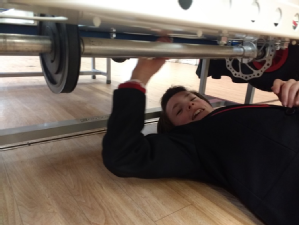 What then for the Formula Goblin racing car? The plan is to take it apart and begin the process over again in 2019, the current Year 5 pupils (at Richard Crosse) will become Year 6 project experts, and a whole new set of children will join them in the bodywork construction role.
What then for the Formula Goblin racing car? The plan is to take it apart and begin the process over again in 2019, the current Year 5 pupils (at Richard Crosse) will become Year 6 project experts, and a whole new set of children will join them in the bodywork construction role.
You can follow the weekly progress of the children on Twitter or You Tube.
WMG enhances collaborative R&D capability with the UK’s most advanced 5G mmWave test platform
Mobile telecommunication operators, infrastructure suppliers, car manufacturers, and local councils are all seeking to understand the benefit from the leap in bandwidth promised by 5G technologies, and are lining up to use the very latest 5G evaluation technology now available at the University of Warwick.
WMG at the University of Warwick has just acquired the UK’s most advanced diagnostic and testing platform for a key part of the 5G spectrum - mmWave. This technology promises to deliver a step change in the amount of data that can be wirelessly transmitted, opening up opportunities for a range of new services and products, including those associated with enabling connected and autonomous vehicles (CAVs).
This has been provided by a £250,000 WMG Centre HVM Catapult award for facilities and people alongside an equipment collaboration with National Instruments (NI) for their mmWave technology platform.
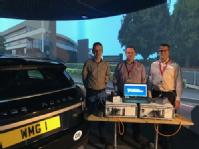 WMG’s Connected and Autonomous Vehicles research team are already working with a range of industrial partners on connectivity, verification and validation, and the understanding and optimisation of user/customer interaction with driverless technology. This new facility will further enhance WMG’s vison to be the UKs “go to” CAV development platform providing unrivalled research and testing that will accelerate product introduction, infrastructure design and implementation. The technology developed will be transferable to other sectors beyond automotive.
WMG’s Connected and Autonomous Vehicles research team are already working with a range of industrial partners on connectivity, verification and validation, and the understanding and optimisation of user/customer interaction with driverless technology. This new facility will further enhance WMG’s vison to be the UKs “go to” CAV development platform providing unrivalled research and testing that will accelerate product introduction, infrastructure design and implementation. The technology developed will be transferable to other sectors beyond automotive.
Archbishop Justin Welby visits WMG, University of Warwick
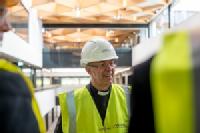 The Archbishop of Canterbury, the Most Reverend Justin Welby, visited WMG at the University of Warwick today (4 May 2018), as part of his ‘homecoming’ tour around Coventry, the city where he was first ordained.
The Archbishop of Canterbury, the Most Reverend Justin Welby, visited WMG at the University of Warwick today (4 May 2018), as part of his ‘homecoming’ tour around Coventry, the city where he was first ordained.
During his visit to WMG, Archbishop Welby toured world-class automotive research facilities, including the Energy Innovation Centre and the new £150m National Automotive Innovation Centre (NAIC) with WMG Chairman Professor Lord Bhattacharyya.
He also joined a small group of business leaders to discuss the future of smart, connected and electrified vehicles, and the renaissance of the automotive industry in the West Midlands– topics which are at the heart of WMG research and development...
WMG to test new location system for intelligent vehicles
Intelligent vehicles and smart devices could gain more accurate location awareness by ‘fusing’ Global Navigation Satellite Systems (GNSS) and WiFi signals – and a test for this is the focus of an Innovate UK project led by Spirent Communications and involving WMG at the University of Warwick.
The £694k ‘Enhanced Assured Location Simulator Leveraging WiFi and GNSS Sensor Fusion’ (ELWAG) project will seek to develop to test this pioneering hybrid WiFi and GNSS location system in a cost-effective, repeatable and safe environment – so that manufacturers can verify its performance.
Researchers at WMG, led by Dr Matthew Higgins, will play a significant role in the project. They will take physical layer measurements of both Wi-Fi and GNSS signals in Autonomous Vehicle scenarios, in and around the University of Warwick campus and the local urban road network.
WMG Professor chairs Royal Academy of Engineering event
 Professor Kerry Kirwan is looking forward to taking part in the fifth Royal Academy of Engineering’s Frontiers of Engineering for Development symposium, which takes place from 29th April to 2nd May.
Professor Kerry Kirwan is looking forward to taking part in the fifth Royal Academy of Engineering’s Frontiers of Engineering for Development symposium, which takes place from 29th April to 2nd May.
The three-day event takes place at the Academy's home, Prince Philip House, in London, UK. Professor Kirwan, who leads our sustainable materials and manufacturing team, will be chairing a session on Frontiers of Engineering for Development: The Circular Economy.
The symposium is part of a series of international, interdisciplinary workshops that aim to facilitate network building, encourage collaborative work and promote international development and cross-disciplinary thinking among the future leaders of engineering from the UK and around the world.
More information on the symposium can be found here.
Privacy and trust in children’s e-books is first focus for new £1.2m study of our future connected world
WMG at the University of Warwick have secured £1.2m grant funding from the Engineering and Physical Science Research Council (EPSRC) to explore how decentralisation, personal data, and our Internet-connected possessions come together on the Hub of all Things (HAT) platform. The first focus of the WMG team’s project will be issues of privacy and trust in children’s e-books.
The WMG team’s Dynamic, Real time, On-demand Personalisation for Scaling (DROPS) project is a collaboration between academics at the universities of Warwick, Surrey, and the West of England. It will examine the privacy, trust, and identity issues that arise from the development of personalized e-books for children's reading. The researchers’ focus on children's reading is motivated by evidence that shows that despite the value of personalised e-books for learning and reading enjoyment, there is a lack of research that engages with the range of privacy issues that these technologies introduce.
Working with the HAT Community Foundation, a non-profit promoting the use of HAT micro-servers for decentralized, person-controlled personal data, the DROPS project will investigate the technology, business, economic, and legal models of personalisation in a newly decentralised digital economy.
One of UK’s foremost NHS chief executives to lead Healthcare Systems activities at WMG
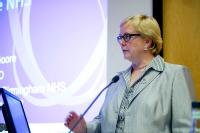 It was announced today, Thursday 26th April 2018, that Dame Julie Moore, currently Chief Executive of University Hospitals Birmingham NHS Foundation Trust (UHB), is to become a Professor of Healthcare Systems at WMG, University of Warwick. Her new role will see her leading on a range of both research and education projects, leading collaborations with the NHS and other healthcare providers.
It was announced today, Thursday 26th April 2018, that Dame Julie Moore, currently Chief Executive of University Hospitals Birmingham NHS Foundation Trust (UHB), is to become a Professor of Healthcare Systems at WMG, University of Warwick. Her new role will see her leading on a range of both research and education projects, leading collaborations with the NHS and other healthcare providers.
Dame Julie has held the position of Honorary Professor, at WMG, since 2013. In that time she has delivered three thought provoking and informative special lectures covering topics such as ‘Is the NHS Succeeding or Failing?’
Professor Stuart Croft, Vice Chancellor of the University of Warwick said
“This is a stellar appointment. Nursing Times has described Dame Julie one of the best leaders in the NHS, and Radio 4’s Woman’s Hour has named her as one of the 100 most powerful women in the UK. I have no doubt that her new research role here with us in WMG at the University of Warwick will result in transformative research that will help enhance the delivery of healthcare across the UK.”
WMG to help Jaguar Land Rover develop self-driving car that can ‘see’ around corners
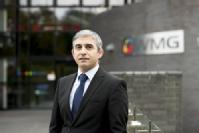 WMG at the University of Warwick is to work with Jaguar Land Rover in a key part of a £4.7 million project called AutopleX which will develop vehicles that can ‘see’ around corners and through obstacles, enhancing the capability of self-driving cars.
WMG at the University of Warwick is to work with Jaguar Land Rover in a key part of a £4.7 million project called AutopleX which will develop vehicles that can ‘see’ around corners and through obstacles, enhancing the capability of self-driving cars.
Jaguar Land Rover is leading AutopleX project to investigate pioneering safety technology for self-driving technology The Innovate UK funded project combines connected, automated and live mapping tech to allow self-driving cars to ‘see’ and ‘talk’ to each other and it brings together Jaguar Land Rover with WMG at the University of Warwick and Highways England, INRIX, Ricardo, Siemens, and Transport for West Midlands.
WMG will bring scientific expertise in the area of connected autonomous driving systems, V2X systems, physical and virtual validation, and cyber security. Using their unique vehicle simulation facilities they will work with partners to create insight prior to physical tests as well as post trial impact assessment in various scenarios that cannot be carried out in physical test due to the environmental restrictions. WMG will also advise the project team on cyber security aspects and will continuously assess resilience of the AutopleX systems against potential cyber-attacks.
